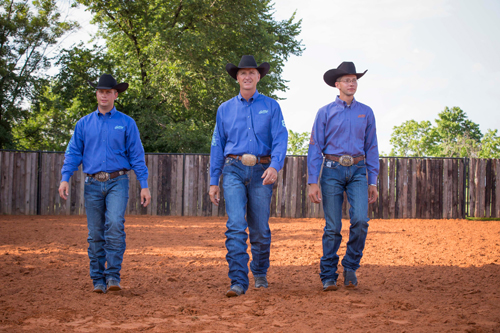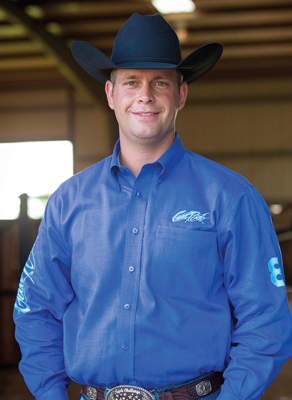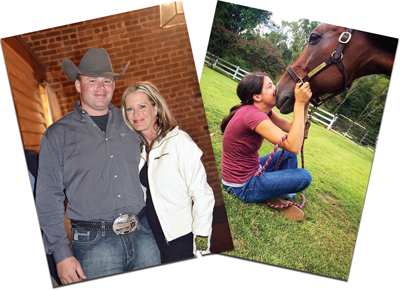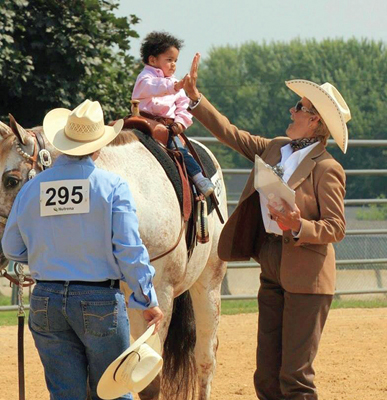 Do what you love and you’ll never work a day in your life. To many horse enthusiasts, this popular adage may seem like a call to transform their love of horses into a career.
Do what you love and you’ll never work a day in your life. To many horse enthusiasts, this popular adage may seem like a call to transform their love of horses into a career.
The job of a horse trainer may seem glamorous: nice facilities, great customers, being paid to travel and show and, of course…plenty of talented horses. But, for many who start on this path it quickly becomes evident that the road to success can be long and bumpy.
Seven years ago Denton DeBuhr went to work as an assistant trainer at Gil Galyean Quarter Horses in Purcell, Oklahoma. He understood from the start the amount of hard work it takes for a program to be successful and clearly remembers what it was like when he started out.
“I wasn’t worried as much about pay, but rather getting someplace where I could really learn how to be successful,” he explained. “I kind of looked at it like going to horse training college, a place you could really build your skills and make money in the future after you get established.”
DeBuhr’s commitment to the Galyean’s program has paid off as he has honed his skills and has been given the opportunity to train, coach and show multiple champions at most of the major National Snaffle Bit Association futurities and premier American Quarter Horse Association shows, including the All American Quarter Horse Congress and the AQHA World Championship Show.
“Obviously, I am pretty happy with my job since I have stayed so long,” he said. “One of the reasons I’m still here is that it is one of those places where the harder I’ve worked, the more opportunities I’ve had. I think that’s important to keep assistant trainers. Not just giving them opportunities but letting them earn opportunities to show horses and be successful.”

Denton DeBuhr
And although the Iowa native said he has learned “a million things about riding,” he has also found the most important lesson came from beyond the saddle.
“The most important thing I’ve learned is how to treat people and that this is the customers’ hobby so it’s important to try to make it fun for them,” he said. “If you do this, handle yourself as a professional, take good care of the horses, hopefully you will put yourself in a position to be successful in the future.”
Sheala Kelley, assistant at Glenn Wells Quarter horses of Williamson, Georgia, also knows about a long-term commitment to her boss, having worked for Wells for a little over seven years. Reflecting back over her tenure Kelley said that there are many reasons she has stayed so long.
“The main thing I truly like and appreciate about Glenn is the fact that he will never ask me to do something he wouldn’t do himself,” she said. “Plus, he has shown me that hard work pays off in our profession.”
She thinks assistant trainers should remember that they are there to make things easier for their boss.
“We assistants should know the bits each horse shows in, the feed they get, how much feed and hay should go to the show, what horses get what supplements and more,” she explained. “These are a lot of little jobs that aren’t always the fun part of training but we are here to learn and that means starting at the bottom and working your way up.”
Alyssa Casa, assistant at NCM Show Horses of Dacula, Georgia, also thinks assistant trainers should make it a point to become involved in all aspects of the program in which they are working.
“I think you need to know a little bit about everything – literally everything – from medicating to wrapping legs to prepping horses to show,” she said. “Banding, braiding clipping, billing and driving the trailer should all be jobs you are comfortable doing.”
Casa also takes the initiative to take on additional responsibilities.
“I personally grain each horse every day so I can stay on top of their health, weight and medications,” she said. “And knowing all of these things helps put my job in perspective and puts me in a better position to be able to run my own business one day.”
The Connecticut native stresses the importance of hard work in becoming a successful assistant trainer and shared concerns for future young trainers.
“I have noticed that some young assistants seem to feel entitled when they enter a program looking to show and ride the top horses right away,” she noted. “If there is one thing that I think could ruin an assistant’s career and the future of the industry, it would be getting handed things instead of earning them.”
Although hard work is what Casa encourages young assistant trainers to make their focus she also has ideas about how trainers can get the best work out of their employee.
“I love the quote ‘A person who feels appreciated will always do more than what is expected,’ and I know this is so true for me and other assistants I know,” Casa said. “I feel like when you can tell that your boss cares about what you are doing and lets you know that you are doing a good job, you will work even harder to continue meeting their expectations.”

Nick and Carmen Mayabb & Alyssa Casa
MacKenzie Fallis is an assistant trainer at Jim and Sandy Jirkovsky’s J/S Training facility in Kearney, Nebraska. She shares Casa’s views.
“If you treat your assistants well, they will keep going the extra mile to take care of you and your business,” she said.
Fallis’ intense dedication to her current employer was not only attributed to the way she has been treated but also to the lessons she has learned during her time at their facility.
“You can learn so much from anyone … good, bad or ugly and take that and learn and build on it,” said Fallis. “One of the biggest lessons that I’ve learned was actually from Sandy’s brother, Butch Campbell, and that is the importance of patience. You don’t have a program, your horse has a program, and the horse will tell you when it’s ready to move on to the next step. You can’t force it. It’s on the horse.”
Fallis said she feels she has a strong fit with Sandy Jirkovsky and thinks it’s important for assistant trainers to find a place where learning is possible and with a person who has similar views.
“That’s why my current job is so great because I get to witness more of the horseman’s way of handling horses rather than just horse training,” she said. “We work together to solve problems, and if we can’t work it through, we call someone or go ride with someone. Young trainers often get too rushed, and they really need to take the time to learn from some of these great horsemen while they are still around.”
Becca Hurst has also found a strong connection in her current role as assistant trainer for Beckey Schooler in Delta, Ohio. She has been a part of Schooler’s program for going on three years now and says that is due to good communication.
“Good communication, in my opinion, is the number one thing to any successful assistant/trainer duo,” she said. And to build this strong communication Hurst believes longevity in a program is important. “In my opinion, you can’t be an assistant hopper; moving from one program to the next quickly. You need to stay somewhere a good amount of time to really get with the program.”
Hurst believes in staying engaged and willing to learn as an assistant to get the most out of the experience.
“The most important thing I have learned is to be very open-minded,” Hurst said. “There is more than one way to train a horse, and you can learn something from everyone.”
The Michigan native said she lives by the rule that you are never too good to learn something new.
“I also love going to the horse shows because I learn little things just by watching other trainers ride,” she said.
Samantha Schinness, assistant trainer for Charles and Angie Cannizzaro’s CAC Show Horses in Purcell, Oklahoma, has only been in her current position for about eight months, but in that time she says she has grown stronger in both her skills as a horseman and as a businesswoman.
“What I appreciate, especially in the program I am in right now, is that the trainer puts as much into it as they expect out of their assistants,” she said. “I feel like we accomplish so much on a daily basis in this program. We work hard and are very efficient. All the horses get out every day and are handled. It’s true here that no horse is left behind, which I love.”

Beckey Schooler & Becca Hurst
Schinness said assistant trainers really appreciate it when they get daily support and guidance from the head trainer or trainers.
“When they are here to help you and guide you in the right direction, it shows that they genuinely care about your success as a horse trainer,” she explained. “Angie and Charles have both, in the short time I’ve been with them, taught me a lot about running a business, including things like billing. I think a lot of trainers leave those details out and it is so important for assistants to learn those things along the way so they aren’t overwhelmed about the business end of training when the time comes for them to go out on their own.”
Schinness also had some sound advice for her fellow assistant trainers about the lifestyle they can expect when selecting a career in the horse industry.
“From my experience, some trainers and assistants get caught up in the lifestyle of their customers,” she said. “As a horse trainer, you can’t do that. Being a trainer is a lot of hard work and your customers are customers for a reason. You need to live a modest lifestyle to be successful financially and to be able to put in the work you need to be successful in the show pen.”
What trainers want from assistants
Numerous assistants have spoken out about their experiences and offered advice about what to expect in a busy training facility. But what do the owners of those facilities want assistants to know?
Beckey Schooler, an AQHA and NSBA judge and owner of Beckey’s Place said it’s plain and simple. A good work ethic is key.
“A good work ethic will make or break you,” she said. “ I look for someone you can trust and that works hard and is open minded. A lazy assistant will never work out.”
Schooler also believes that lack of communication is often a damaging flaw.
“Mistakes generally happen due to miscommunication between the head trainer and assistant,” she explained. “Therefore, if you maintain good communication, you can avoid a lot of mistakes.”

Sandy Jirkovsky
Sandy Jirkovsky, who holds judging cards from AQHA and NSBA as well as from the National Reining Horse Association and National Reined Cow Horse Association (NRCHA) agrees.
“A good assistant trainer must possess many qualities, but the first of these is a passion for the horse,” she said. “An assistant trainer’s job consists of long hours, dealing with many personalities, and not always a life of glamour. If they don’t have the passion and love of the horse their job just becomes a job.”
Jirkovsky said the best advice she has for an assistant trainer is “DO YOUR JOB – and then some.”
She feels strongly that it is important for assistant trainers to find the best horseman in the industry they can and learn as much from them as they can.
“They need to choose their mentors carefully as not only will that trainer influence their training education, but will also shape their beliefs in life and business,” she said.
Glenn Wells also looks for an assistant with passion for the work and a willingness to learn and work as hard as they can.
“They must also have a natural riding ability, a love for animals and good people skills,” he said. Wells also stressed the importance of patience. “I believe the most common mistake assistant trainers make is wanting to skip important steps in the training process to rush the end results,” he said.
So what do head trainers think is a length of time an assistant should devote to one program before they move on? NSBA’s first Million Dollar Rider, Gil Galyean, has deep roots in the horse industry and he said he believes that young trainers should look for programs that fit their goals and riding style and stick with it.
“If an assistant is in a good situation, I think it’s very important for them to stay,” he explained. “You don’t want to get a reputation as someone that bounces around a lot. Owners want stability and are not going to be eager to send a horse to someone who has been known to stay six months one place and six months another.”
Galyean also believes there is a bright future for assistants, but not without first crossing obstacles.
“I think there’s a demand for people that ride and hold themselves to high standards, conducting a business that customers can feel good about,” he said. “At the same time, it’s not easy. You have to have a good facility to develop and train horses, which is expensive. Often this cost can be prohibitive. So, there are issues other than talent that can present themselves to young trainers wanting to go out on their own.”
Charles Cannizzaro, an NSBA carded judge, said he believes longevity in a program is also important for long-term success.
“I believe assistants should stay somewhere a decent amount of time, about three to five years, because programs differ,” he explained. “All trainers get to the same side of the fence but there are a lot of different ways to reach that goal. If the assistant had the drive and initiative to come to work for a trainer, they need to give it time to learn the full program, and I believe that takes about three years. After five years, I think it’s good to diversify and start learning from someone else to further their skills.”
Cannizzaro also cautions young trainers about unrealistic expectations.
“In years past, 10-15 years ago, it was not uncommon for an assistant to really get in the trenches and work for several years before they were ever able to show,” he said. “ Nowadays, with society like it is,\ I see a lot of people feeling entitled. If an assistant doesn’t get to show in a year or so, or isn’t getting what they consider good horses, they are already wanting to move on.”
He said that can be a big mistake.
“I hear young folks saying things like, ‘I don’t even fool with the horses that do this or have this bloodline,’” going on with a laugh. “How can they even have an opinion at only 20 years old…how many could they have really ridden? You rode five that weren’t great and now you have an opinion on the other hundreds of them?”
Cannizzaro said that attitude is disappointing to him.
“It concerns me because an assistant should realize that when they go on their own there is nothing in stone that says they will get the best horses. They must be willing to take the bad with the good,” he explained. “Part of being a trainer is taking a horse with average abilities and making it the best it can be. Every horse doesn’t get to show at the Congress, World Show or NSBA World. Those are the elite few. The backbone of our industry rests on horses with average abilities. It is doing your job to get that horse broke and presentable for you and your customer. That’s what being a trainer is about.”


You must be logged in to post a comment Login